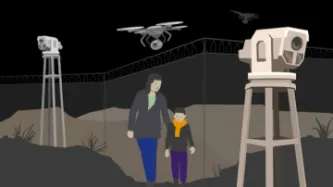Search
Content type: Examples
The Greek defence startup Lambda Automata is putting up "Outpost" autonomous observation towers to enhance monitoring of the country's numerous islands in the Aegean Sea, important in territorial conflicts with Turkey. The towers use computer vision algorithms to turn CCTV cameras into situational awareness tools; they are solar-powered and can accommodate third-party sensors to expand their functions. https://greekcitytimes.com/2022/10/04/autonomous-greek-islands-threats-tec/…
Content type: Examples
Cellebrite, which provides technology to unlock phones and access their data, asks its government agency customers to keep both its technology and the fact that they used it secret, a leaked company training video shows. Such a request violates the rights of the public to expect that authorities are transparent when asking judges to authorise searches. In the video, the company employee claims that disclosure could hinder law enforcement and help criminals.https://techcrunch.com/2023/08/19/…
Content type: Examples
Sir John Sawers, the head of MI6 between 2009 and 2014, set up a meeting between Palantir CEO Alex Karp and the Cabinet Office permanent secretary, John Manzoni, in 2019; a year later the US-based company was awarded a £27 million contract to process border and customs data without competitive tender. Palantir's strategy appears to be to offer £1 contracts to provide services to gain a footing, and then raise prices once established. It has also hired former public servants and NHS executives.…
Content type: Examples
Republic Squiare, one of the cultural and social hubs of the Serbian capital, Belgrade, is under constant surveillance by equipment made by the Chinese company Huawei that recognises faces, identifies vehicle number plates, and judges whether activities are "suspicious". Despite controversy over the cameras, Belgrade plans to extend the network to 8,000 cameras as part of a "safe city" partnership with Huawei. Similar installations are taking place across the world, exporting China's values to…
Content type: Examples
When the Los Angeles Police Department opted to monitor the messages posted in forums on Neighbors, a companion app to Amazon's Ring doorbell cameras, the system forwarded over 13,000 messages in just over two years. Research shows, however, that this type of surveillance does a poor job of deterring property crime. A study of Neighbors posts in LA also shows that posters typically live in whiter, more affluent districts, and about 30% of posts did not describe criminal activity, just behaviour…
Content type: Examples
The UK Home Office has drawn up secret plans to draft a letter lobbying the Information Commissioner's Office to allow the privately held company Facewatch's matching service to spread into retail shops and supermarkets across Britain in order to curb shoplifting. The strategy was agreed in a meeting between Facewatch, policing minister Chris Philip, and senior Home Office officials. It is not known what contact, if any, between the Home Office and the ICO followed the meeting.https://www.…
Content type: Examples
The UK's Home Office is expanding its contract with the Portuguese company Tekever, which has supplied live-streamed drone footage captured by a combination of radar, video, and infrafred imagery through a £1 billion contract since 2020; this contract is now being extended to monitor large stretches of the English Channel in new ways. The UK is just one of many countries that see drones as a "game-changer" in patrolling borders and trapping human smugglers. The global drone market is expected…
Content type: Long Read
18th December is International Migrants Day. It’s a day designated by the United Nations, dedicated to recognising the “important contribution of migrants while highlighting the challenges they face.”On this day we wish to recognise in particular the countless human rights violations that people experience at borders and within hostile immigration systems. We thank those who survive these violations for sharing with us and others their experiences of such violations, and for accepting to…
Content type: Explainer
The Free to Protest Guide Pakistan has been created by adapting Privacy International's (PI) Free to Protest Guide UK according to the laws and policies of Pakistan, in collaboration with PI and local activists in Pakistan.The Guide has been published in English, Urdu, Punjabi and Pashto.DISCLAIMER: This guide forms part of PI's global work to highlight the range of surveillance tools that law enforcement can use in the protest context, and how data protection laws can help guarantee…
Content type: Examples
The call centre company Teleperformance, which employs about 380,000 people in 34 countries providing customer service for dozens of major UK companies and government departments, has told some non-UK staff that AI-powered webcams will be installed in their homes to watch for infractions of company rules while they work. Workers will have to click to indicate they're taking a break if they leave their desks and provide a reason. They will also be warned that stopping keyboard and mouse activity…
Content type: Examples
A new report from Worker Info Exchange finds that drivers working for Just Eat have had their accounts abruptly de-activated by automated systems for alleged overpayments as small as £1.35, which many are contesting. Just Eat says that the overpayments were triggered because drivers had incorrectly recorded themselves waiting for an order when their GPS coordinates did not show them at the restaurant. In several cases, the GPS data however showed that they remained within a couple of minutes’…
Content type: Examples
A survey commissioned by the UK's Information Commissioner's Office finds that a fifth of UK adults believe they have been monitored by an employer. Timekeeping and access were most commonly tracked, followed by emails, files, calls, or messages. Seventy percent said they would find such monitoring intrusive. Studies say that excessive tracking is associated with higher staff turnover rates and can be counterproductive. https://www.theguardian.com/world/2023/oct/02/uk-adults-monitored-by-…
Content type: Examples
Four French trade unions representing drivers signed an agreement with ride-hailing platforms to provide drivers with a minimum income and provide greater transparency regarding suspending and terminating drivers. Platforms must now give drivers a chance to respond before deactivating their accounts and must provide compensation based on previous income if an account's suspension proves unjustified. https://www.bfmtv.com/economie/entreprises/vtc-nouvel-accord-entre-plateformes-et-syndicats…
Content type: Examples
Despite being a subscription service that doesn't depend on advertising revenue, Slack (owned by Salesforce) collects a large amount of data on the people who use its system, including details provided voluntarily at sign-up, when and how people use the platform, and information about third-party services users connect to it - and never deletes any of it. Users newly added to a channel can read the entire range of historical messages and files. Messages users send are controlled by the…
Content type: Examples
Human raters have played a significant role in the rapid improvement in the machine learning models that fuel modern AI. The raters evaluate the algorithmic output of search engines and AI chatbots and provide "Reinforcement Learning with Human Feedback" (RLHF) – the technical name for the deployment of such ratings to improve AI models. The efforts of these workers, who are mostly located in the global South but include thousands in the US, is downplayed by the technology companies to whom…
Content type: Examples
In two cases brought by Worker Info Exchange and the App Drivers and Couriers Union on behalf of drivers, the Court of Appeal in Amsterdam has upheld a 2021 ruling in a lower court that under the GDPR Uber and Ola Cabs must disclose the personal information and profiling that the companies use to create "fraud probability scores" and "earnings profiles" to workers. These scores and profiles are in turn used in automated decision making to allocate work and pay rates. The court rejected the…
Content type: Examples
A large-scale preprint study of more than 100 million rides between 2018 and 2019 in Chicago, where a 2020 law requires ride-hailing apps to disclose fares, finds that the dynamic pricing algorithms used by ride-hailing companies such as Lyft, Uber, and Via are socially biased. The finding is in line with earlier studies by other organisations such as the Princeton Review that found bias in algorithmic pricing. The researchers found that prices for rides varied according to the average…
Content type: Examples
An eight-country study of Amazon employees has found that 57% say the company's performance monitoring system damages their mental health, 51% (65.7% of drivers) say it's had a negative effect on their physical health, and 59% feel the monitoring is excessive. In addition, 58% say Amazon doesn't explain clearly how it uses the data it collects on workers. Injury rates at Amazon warehouses are above the industry average.https://uniglobalunion.org/news/globalsurvey23/Publication: UNI Global…
Content type: Examples
Workers in Amazon warehouses are tracked closely by a system that records every minute of "time off task" via the radio frequency handheld scanners workers use to track customer packages. Breaching strict time off task time limits can get an employee fired. Time off task includes bathroom breaks, talking to other Amazon employees, or going to the wrong floor of a warehouse: - managers may be required to ask offenders to account for each missing minute. https://www.vice.com/en/article/…
Content type: Examples
AI-powered cameras made by the startup Netradyne and used in Amazon's delivery vans incorrectly penalises drivers for events beyond their control or which do not constitute unsafe driving such as if they are cut off by another vehicle. The data collected by the cameras is sent to Amazon, which uses the information to evaluate drivers' performance by assigning them with a score for safe driving. https://www.vice.com/en/article/88npjv/amazons-ai-cameras-are-punishing-drivers-for-mistakes-…
Content type: Examples
Humans who review footage of warehouse workers flagged by Amazon’s AI computer vision system to check for employee errors - are themselves surveilled in detail to ensure they make punishing targets. The workers, who are paid as little as £212 a month to review thousands of images and videos per day, report physical problems, deteriorating eyesight, and cognitive exhaustion. https://www.thebureauinvestigates.com/stories/2022-11-21/the-eyes-of-amazon-a-hidden-workforce-driving-a-vast-…
Content type: Examples
The San Francisco-based company Emotiv claims its MN8 electroencephalography device can be worn comfortably for a full workday. The device monitors an employee's brainwaves with the goal of creating safer, more efficient workplaces by monitoring workers' brain signals for signs of stress or distraction. Company president and neuroscientist Oliver Oullier says the data the device collects makes it possible to reschedule tasks and working hours to lessen stress and increase focus. Emotiv says all…
Content type: Examples
JP Morgan Chase's hundreds of thousands of employees are monitored in detail throughout their working day with the collected data sent to the data management system Workforce Activity Data Utility, which the company began building shortly before the coronavirus pandemic started. Some employees say it is not clear to them why the bank tracks how much time they spend on Zoom calls or writing emails or how this data will be used to assess their performance. They say that fears around how the data…
Content type: Examples
Delivery drivers in Jakarta use GPS-spoofing apps in order to improve their chances of selection by the Gojek delivery and transport app, an equivalent to Apple Pay, Postmates, Venmo, and Uber all in one. Gojek that operates in more than 200 cities in Indonesia, Singapore, Vietnam, and Thailand. Other grey market apps enlarge details of orders that are too small to read, automate bidding, and apply filters to open orders. Some apps are distributed via Google Play; more are sold via driver…
Content type: Examples
Content moderators working in the south Asian IT hub Hyderabad say their work reviewing still and video images of sexual and violent content is straining their mental health. Paid less than £8 a day, the moderators say the wellness coaches the company supplies do little beyond moving them to a less sensitive queue until they feel better. In some cases, managers tell the moderators to leave up content they'd rather remove, such as animal killings. Humans are needed for this work; AI is…
Content type: Advocacy
Privacy International joined civil society efforts to call the South African Parliament not to approve the draft General Intelligence Laws Amendment Bill 2023 (GILAB), which was approved by the Cabinet and introduced in Parliament.
The Bill was proposed by the South African government, after the Constitutional Court found the Regulation of Interception of Communications Act of 2002 (RICA) unconstitutional on multiple grounds.
The draft Bill fails to meet the human rights standards on many…
Content type: Advocacy
Content type: Long Read
Our world is undergoing a seismic process of increasing digitisation, which sees the proliferation of new technologies and the growing integration of these technologies into public services, which rely more and more on copious amounts of personal data and on automated processes. This phenomenon has a unique impact upon the rights of persons with disabilities. As the era of global digitisation causes societies worldwide to undergo a digital metamorphosis, persons with…
Content type: Examples
Police in Western Australia have demanded that ABC hand over all the footage of climate protesters it collected in preparing a programme ("Four Corners") about them. More than 40 civil society groups have opposed the request, saying that the demand undermines press freedom and urging the broadcaster to protect its journalists' sources. https://www.theguardian.com/australia-news/2023/oct/05/wa-police-order-abc-to-hand-over-four-corners-footage-of-woodside-protest?cid=…
Content type: Examples
Myanmar's ruling junta has begun a pilot census in 20 townships across the country, and has said that a national census needs to be completed in 2024 before new elections take place, which could be in 2025. Critics warn that the census will be used to increase surveillance of opponents, including protesting civil servants, doctors, and teachers. Myanmar also intends to roll out an electronic identification system and has asked China for help in designing it.https://www.abc.net.au/news/2023-10-…




